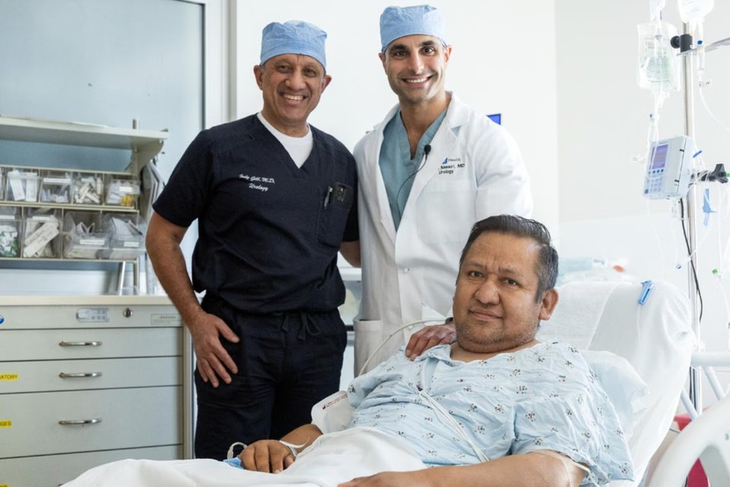Contact Admission
International Collaboration
The United States successfully performed its first human bladder transplant
A team of doctors in Southern California, USA, has recently performed the first bladder transplant in a human, offering new hope for patients suffering from severe and difficult-to-treat bladder diseases.
Dr. Inderbir Gill (left) and Dr. Nima Nassiri (right) performed the surgery, with the patient being Mr. Oscar Larrainzar (41 years old), who suffered from a rare form of bladder cancer – Photo: UCLA HEALTH
According to The Straits Times on May 20, the bladder transplant surgery was carried out by doctors from the University of California, Los Angeles (UCLA) and the University of Southern California (USC) for Mr. Oscar Larrainzar – who had lost most of his bladder function due to treatment for a rare form of bladder cancer.
After the surgery, Mr. Larrainzar (41) happily shared during a follow-up visit on May 18: “I used to be like a ticking time bomb. But now I have hope.”
In addition to the bladder transplant, Mr. Larrainzar also received a kidney transplant during the same surgery, as both of his kidneys had been removed nearly four years earlier.
What surprised the doctors was that once his new kidney and bladder were connected, urinary function began almost immediately — whereas typically it takes up to a week after a kidney transplant for urine production to start.
“His creatinine levels (a measure of kidney function) started improving right after the transplant,” said Dr. Nima Nassiri, who performed the surgery.
The doctors plan to perform four more bladder transplants as part of a clinical trial, before expanding the research to a larger scale.
Previously, most patients who had their bladder removed would undergo a procedure using part of the intestine to create a urinary diversion.
However, because intestinal tissue contains many bacteria, introducing it into the urinary tract — which is normally sterile — increases the risk of complications. According to Dr. Inderbir Gill, the complication rate for this method can be as high as 80%.
Therefore, Dr. Inderbir Gill — who performed the surgery alongside Dr. Nassiri — called this transplant “the realization of a dream” in treating thousands of patients suffering from chronic pelvic pain, inflammation, and recurring infections.
“There’s no question: a door of potential has been opened for people who previously had no hope,” said Dr. Gill, who also serves as Chair of Urology at USC.
Nonetheless, some experts remain cautious. Dr. Rachel Forbes — a transplant specialist at Vanderbilt University Medical Center — noted that the biggest risk remains the body’s immune response (rejection) after an organ transplant, as well as the side effects of immunosuppressive drugs.
“This is clearly a technical advance, but we already have established options for people without a bladder that don’t require immunosuppressive drugs. Unless a patient already has to take such medications — as in Mr. Larrainzar’s case — I worry that this method might be trading one type of complication for another,” Dr. Forbes said.
Other news
- 88-year-old woman in the Czech Republic “come back to life” ( 08:12 - 05/06/2025 )
- ChatGPT Bot Flunks Gastroenterology Exam ( 13:25 - 31/05/2023 )
- Clinical Methods, 3rd edition The History, Physical, and Laboratory Examinations ( 09:38 - 26/05/2023 )
- DISCOVERY OF THE SECOND PERSON IN THE WORLD WITH ALZHEIMER’S RESISTANT GENE ( 09:54 - 24/05/2023 )
- Polypharmacy killed my son. He’s not alone ( 14:57 - 23/05/2023 )
- Limit PSA Screening to Men With Symptoms ( 10:34 - 22/05/2023 )
- Vitamin D and Type 2 Diabetes: New Insights ( 10:49 - 18/05/2023 )
- Med Students Gain Momentum in Push to Ban Legacy Admissions ( 13:28 - 17/05/2023 )
- Orthodontic Biomechanics Workshop at Phan Chau Trinh University ( 14:40 - 11/10/2022 )
- About 30% of adults have excess cholesterol ( 10:11 - 09/11/2020 )



















